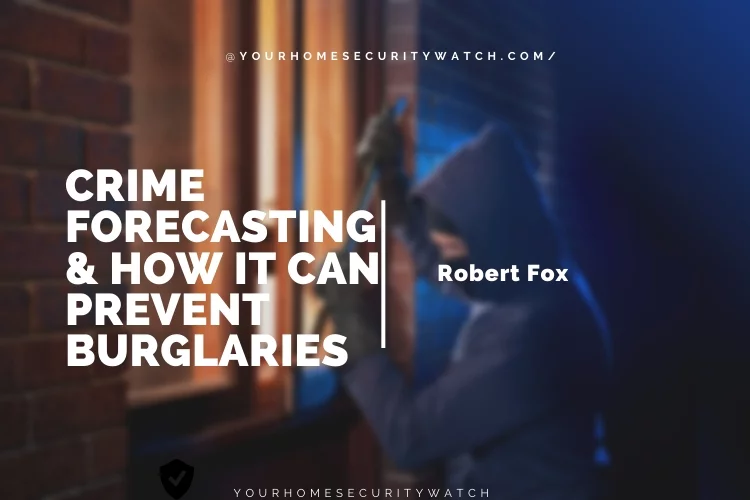Crime Forecasting & How It Can Prevent Burglaries
by Robert Fox
Have you ever wondered if there was a way to actually predict break-ins and burglaries and hence prevent them?
For instance, if it was common knowledge that most burglars usually struck at 7:30pm sharp, wouldn't we all be more diligent around this time?
It sounds kind of ridiculous, to think that maybe criminals are just as predictable as when birds start to chirp in the morning, or when a cat wants to be fed, but, as it turns out, the behaviour of burglars and criminals is actually much more predictable than you might expect.
Contents
Now, of course having a secure home means having a home that is secure 24/7, but would you be interested to know that there is field of study out there called "crime forecasting", and its actual a detailed study of statistics as to where and when criminals strike, not to mention how and even why.

Just like algorithms on the internet these days are so intuitive that your smart phone knows where you are, where you bought lunch (and a lot more), authorities are using this type of data collection to put together a database that tells us more about the criminal element of society than many of us would feel comfortable knowing about. Hey, if you think a company like Google knows a few things about you, just imagine what the FBI knows!
FBI 2013 New Approach To Offender Profiling
One thing that we assume burglars have on us regular folks is the element of surprise. As it turns out, maybe their habits are a lot less surprising than many of us think. In fact, maybe their habits are the opposite of surprising - studies show that criminals are quite predictable.
Consider this - the FBI has been working hard on developing a new profiling systemon burglars.
Considering that burglaries are one of least solved crimes ever, with on average only 13% of them getting solved, and costing on average $2000 in losses each time ($20 000 after legal fees) for each time a burglary happens, it might be worth the effort to look at some of this data on how burglars operate.
Here is a video by Crime101x which talks about solving a crime by learning more about about the suspect, or criminal profiling.
This video will give you an idea of how this type of profiling is done. From there, we can begin to see why the FBI's work in this field is so valuable, and also, we can start to see how it fits into understanding the mind of a burglar so we can predict their behaviour better.
You might say, "I don't want to understand the mind of a criminal". We can certainly understand that, but on the other hand, what if understanding the mind of a burglar isn't really that difficult, since most burglars are the way they are because of lack of education and other unfortunate circumstances.
Crime Forecasting and How It Can Help Prevent Burglaries
If you read the study called " Simple Indicators Of Crime By Time Of Day", written by Marcus Felson and Erika Poulsen in 2003 for the International Journal of Forecasting, it is clear that some people actually have a very good working knowledge of the psychology of some of these criminals. The study and application of this type of predictive data is called "crime forecasting".
If you consider that people are reactive in nature, meaning we hear that there was a break-in down the street, and this causes us to react by changing our locks or assessing our security situation. This is quite natural, and this is another reason that looking at these statistics which are out there are useful to us. We may not think that this data will change our behaviour, but it can.
How Crime Forecasting Works
Crime forecasting is a relatively new science. It simply takes real crime data and breaks it down by region, and time, and other types of circumstances.
To be more specific, if you knew for a fact that in the past 20 years, 40% of burglaries were happening between the hours 1 and 3pm in the area in which you live, what would you do? Might this information make you stop and think for a minute?
To be clear, crime forecasting looks at regional data and makes predictions from it. If you have access to this info, at the very least it will make you think. And this info is actually available to anyone who wants to see it.
Yes, crime experts have been digging up this information for a while now and it is helping to cast a light on certain types of crime, like burglaries.
Albany NY Stats In The Year 2000
For instance, one statistic says that in the year 2000, in Albany, NY, 0.25% of all robberies happened between 7am and 7:59am. In other words, most burglaries did not take place between these hours.
Another stat mentions that 8.62% of all robberies in Albany happen between 8-8:59pm (the highest percentage they show). This means that, for whatever reason, over 34x more robberies were happening between 8-8:59pm than there were happening at 7 to 7:59am.
If you are from Albany are interesting stats, and it might make you a bit more vigilant during these hours knowing when the majority of break-ins have been known to happen.
Crime Forecasting Resources
Check out some of these pages to get more informed about crime forecasting and how it can work for you:
Predictive Policing: Using Technology to Reduce Crime
PDF: Gorr and Harries Introduction to crime forecasting
PDF: Safety and Justice Program
Development of Crime Forecasting and Mapping Systems for Use by Police
Applying Crime Forecasting
Were this crime forecasting data more accessible for your average homeowner, it would be very, very helpful. As it stands, you do have to do a bit of work to find these stats.
A great place to look for stats is on the FBI's own website, although it may not be everyone's idea of light reading. They don't actually have an interactive crime forecasting "section", although their crime stats section is a huge resource.
If there were a way to combine this type of a data with the various Neighborhood Watch groups in North America, who could surely use this information, we think this would be a step forward towards a safer world. Neighborhood Watch groups across America already have strategies implemented for keeping the streets safe, but we don't think they have access to any kind of huge crime forecasting database at this time, which could really assist their efforts if it were made available to them on an annual or perhaps biannual basis.
To Conclude
Home security should be a priority to anyone with a home, but whether you want to take your own education to the next level by learning about what's happening at the forefront of crime prevention is up to you. If nothing else, we hope you found this article interesting and maybe it can lead a few people to resources and information they may not have known about before.
More from my site
 |
 |
 |
 |

About Robert Fox
Rob Fox is a former hydro worker who used to teach self defence in Miami for 10 years. He's currently enjoying his retirement, playing cribbage and golf with his buddies, locksmithing and home security in his spare time. Rob is an avid reader, and has even written a few books on the subject of self defence.
Thoughts on "Crime Forecasting & How It Can Prevent Burglaries"
 |
 |
 |
 |
Check These Out
You can Get FREE Gifts. Furthermore, Free Items here. Disable Ad Blocker to receive them all.
Once done, hit anything below
 |
 |
 |
 |